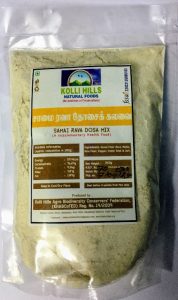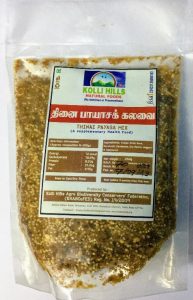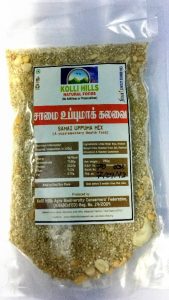Learn about the journey of Kolli Hills Natural Food Shop and how it has brought positive changes for the community
Kolli Hills, located in the heart of Tamil Nadu’s Namakkal district, is situated approximately 50 kilometers from Namakkal town. It is home to approximately 50,400 people living in 305 small villages and 14 village panchayats, primarily belonging to the Malayali tribal community. The majority of the people in this area depend on farming cultivating crops such as black pepper, coffee, cardamom, millet, jackfruit, mango, lemon, pineapple, and various spices. Despite this, small-scale farmers face significant challenges in selling their produce.
One of the primary obstacles is the remote location of Kolli Hills, with the nearest market situated 70 to 80 kilometers away in the plains. The distance makes it expensive for small farmers to transport their goods to the market, and the returns on their products often do not justify the cost. Additionally, due to the high moisture content in the air, storing their products for an extended period is not feasible. As a result, many farmers resort to selling their products by the roadside or at the local Solakadu market. Kolli Hills remains relatively untouched by commercial tourism, further exacerbating the challenges faced by farmers.
About Kolli Hills Natural Food Shop
The Shop was established in 2009 and facilitated by MSSRF with support from NABARD and KHABPCoL. It serves as a model shop designed around the 4C integrated approach: Conservation, Cultivation, Consumption, and Commerce. This initiative has proven invaluable for tribal farm families by aiding them in conserving and effectively managing agro-biodiversity.
Managed by the Valvil Ori Self-Help Group, the Kolli Hills Natural Food Shop offers more than 24 different products, primarily centered around millet-based value-added items, various spices, and fresh fruits. It stands as a ray of hope for the farmers in Kolli Hills, providing them with a platform to showcase their natural products and value-added goods. The materials used in the shop are sourced from different parts of Kolli Hills collected from small-farmer groups. These materials are sent to the Valavanthi Nadu processing unit, where all products are cleaned, dried, and transformed into value-added items, such as ragi malt, rava upma mix, millets laddoo, Samai Upma, millet dosa mix, and millets payasam, in addition to a wide range of spices and fresh fruits.



Small-farmer groups play a crucial role in the operation of the Shop. They do not have large quantities of products to sell – their quantities range from 50kg to 100kg. It can be both time-consuming and costly for them to travel to distant markets to sell their products. Therefore, they often prefer to sell their products locally at the Shop. The promotion of value-added products has increased the acceptability of local products, contributing to the growth of the local economy.
Looking at an economic boost, also sustainability
The Shop has introduced an initiative that offers ready-to-eat food products right in front of the shop. Tourists are hesitant to buy ready-to-eat food products because they were unsure how to prepare them, so now with the introduction of the ready-to-eat food stall, customers have the opportunity to taste the cooked food. This approach has proven to be highly effective because not only does it help them make informed choices, but also encourages them to buy these products.
The setup motivates both local residents and tourists to sit together, discuss local food products, and share their experiences. This leads to positive word-of-mouth promotion for the Kolli Hills Natural Food products. Additionally, the presence of recipe cards further motivates tourists to buy these products, as they can replicate the flavors at home.
In this way, the Shop contributes to boosting the local economy. It also strengthens the interconnectedness between small-farmers and SHG members, as they depend on and support each other in increasing income and ensuring the sustainability of their efforts.

